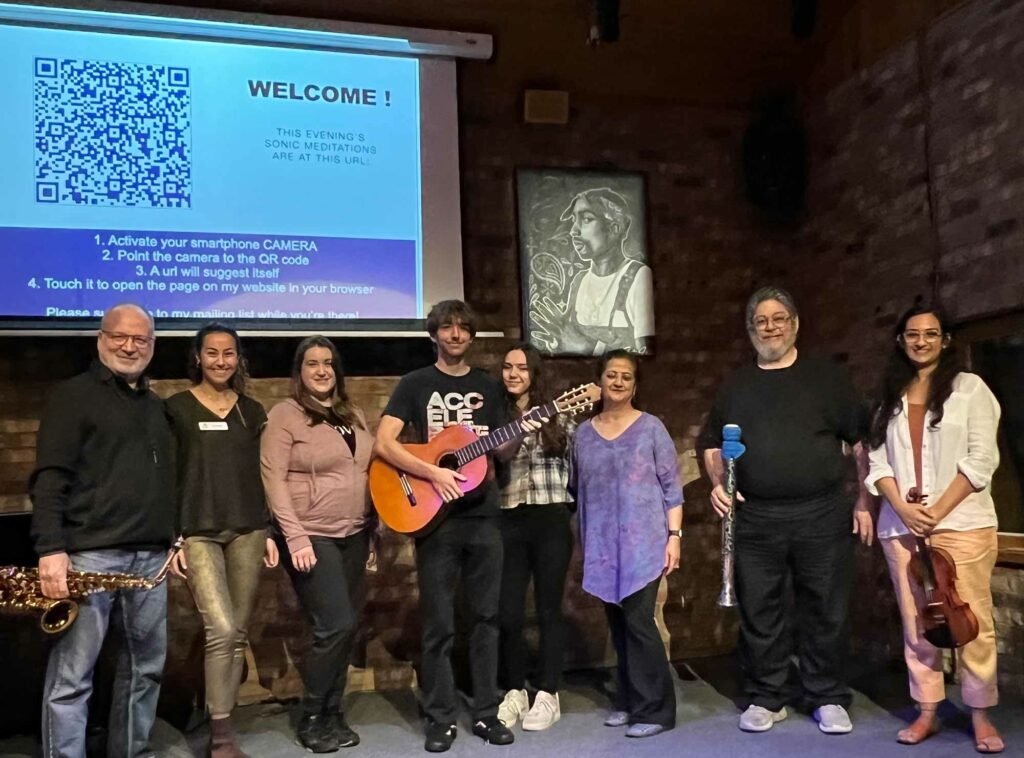Deep Listening is a composer’s sound practice devised by the legendary composer and thought leader, Pauline Oliveros (1932-2016). It is open to everyone and devised to serve and expand our well-being, especially for those drawn to music and sound. In 2025, I led the last three of 28 monthly Deep Listening events: 1/15, 2/19 and 3/19 at the Timucua Arts Foundation.
From August 2022 through March 2025, we met At the White House of the Timucua Arts Foundation on the third Wednesday of the month (Sundays in 2022). I introduced DL as I was taught by Pauline Oliveros, IONE and Heloise Gold. My goal was to build a community of DL practitioners: an environment welcoming to everyone to explore its daily benefits, to become a monthly refuge to share sacred quiet and revere the miracle of sound; a group that would thrive sharing ideas, friendship and leadership.
Timucua is a perfect venue for DL with its perfect acoustics and ACS. Attendance was free (donations accepted). Benoit allowed us to use the house instruments (a fine grand piano, contrabass, acoustic and drums). I loved teaching DL to the general public, and am ever grateful for Timucua Arts to stand behind me for three years trying to get this community of the ground. Special thanks to Logan, Lia, Keaton and Paul for their open minds and hearts to the significance of DL and the moments we created together!
For a more thorough understanding of my relationship with Deep Listening:
Pauline Oliveros on Deep Listening
“What Is Deep Listening?
For me Deep Listening is a life long practice. The more I listen the more I learn to listen. Deep Listening involves going below the surface of what is heard, expanding to the whole field of sound while finding focus. This is the way to connect with the acoustic environment, all that inhabits it, and all that there is.
Deep Listening is a practice consisting of listening and sounding exercises and pieces I and others have composed since 1970. The results are processed by group discussions in workshops and retreats. Deep Listening is for musicians as well as participants from other disciplines and interests. Previous musical training is not required.
The key to multi-level existence is Deep Listening – listening in as many ways as possible to everything that can possibly be heard all of the time. Deep Listening is exploring the relationships among any and all sounds whether natural or technological, intended or unintended, real, remembered or imaginary. Thought is included. Deep Listening includes all sounds expanding the boundaries of perception.
We open in order to listen to the world as a field of possibilities and we listen with narrowed attention for specific things of vital interest to us in the world. Through accessing many forms of listening we grow and change whether we listen to the sounds of our daily lives, the environment or music. Deep Listening takes us below the surface of our consciousness and helps to change or dissolve limiting boundaries.
Deep Listening is a birthright for all humans.”
Taken from the Center for Deep Listening.
The above video demonstrates the beauty, depth, and mystery held by the combination of simple instructions and Deep Listeners called “LISTENING OUT LOUD.” The instructions are”Inhale Deeply. Exhale singing a note of your choice. Listen to the sounds around you and match your next note to one of them. On your next breath, make a note no one else is making. Repeat.
Deep Listening music has an analogy to swarming, common in nature where individuals follow simple rules and the group exhibits complex, coordinated behavior. There is no central command or authority. If birds leaves the group, the swarm still happens. Imagine you’re one of those birds, following the simple instructions of a Sonic Meditation – noone knows where it might go….!



